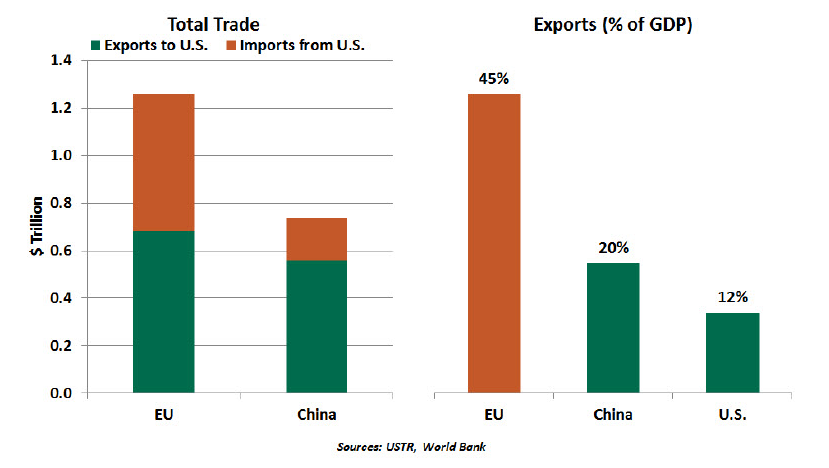In more bad news for Europe and trade, the World Trade Organization (WTO) concluded 15 years of litigation over European nations’ subsidies to Airbus. The ruling gave the United States clearance to immediately place tariffs on $7.5 billion worth of European goods annually.
The tariffs are applied to a range of imports including aircraft, wine, whiskey, olive oil and cheese from the key European Union (EU) member states that formed Airbus in 1970. The agriculture and food industries have nothing in common with the airline industry, yet their political significance makes them a target for tariffs. WTO rules allow for countermeasures to target products that aren’t even remotely related to the blamed industry. The EU has filed a counter-complaint about Boeing to the WTO, which is expected to rule on that matter in the first half of 2020.
Trade relations between the U.S. and the EU were already strained in the wake of steel and aluminum tariffs enacted by the U.S. in 2018, which prompted retaliation from the EU. And the U.S. has threatened to impose tariffs on Europe’s (specifically Germany’s) most important industry: automobiles. The potential damage to the European economy from automotive tariffs would be much greater than that from the recent Airbus-related tariffs.

The threat of escalating trade tensions between the U.S. and the EU is a concern for both sides. Exports account for 45% of the EU’s economy, compared to 20% and 12% in China and America respectively. Total trade between the U.S. and the EU is far bigger than trade between the U.S. and China. Europe is a key market for American exports, far more so than China.
Fear of economic fallout is likely provoking the U.S. administration to seek a truce with China, as uncertainty is weighing on business investment. External uncertainties are weighing on the EU as well, reducing its appetite for tariffs and tit-for-tat countermeasures. Both sides would benefit from a negotiated resolution to the transatlantic trade tiff. Opening a new front in the trade war will be excruciating for everyone, especially those Americans who love their Scotch.
Carl R. Tannenbaum is executive vice president and chief economist at Northern Trust. Ryan James Boyle is a vice president and senior economist within the Global Risk Management division of Northern Trust. Vaibhav Tandon is an associate economist within the Global Risk Management division of Northern Trust.








